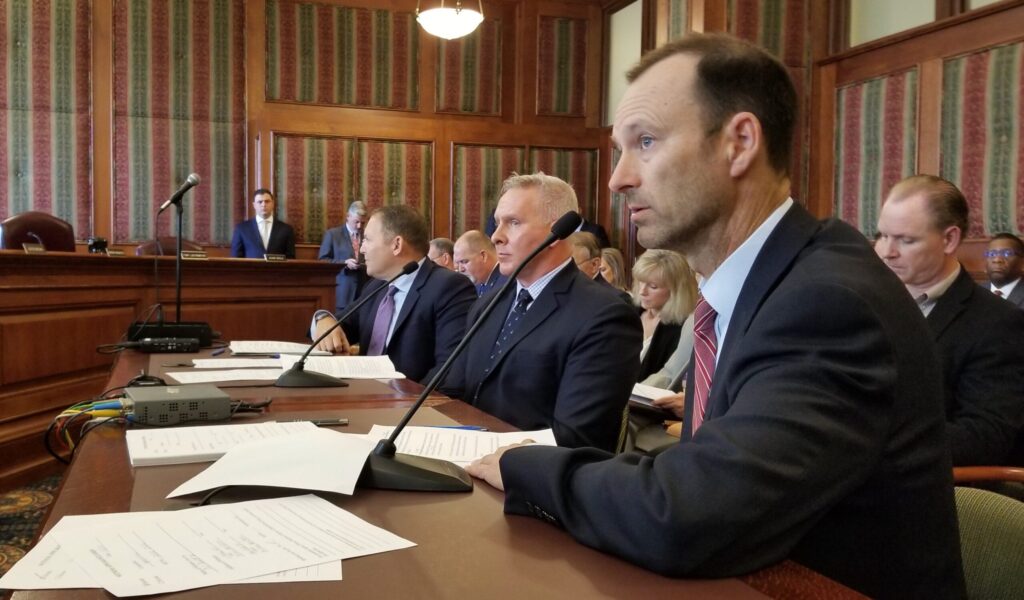Bypassing the Missouri Legislature, the nation’s two largest sportsbooks are working full speed ahead with their goal of hitting home base with huge winnings.
A constitutional amendment legalizing sports betting is set to appear on the Nov. 5 ballot as Amendment 2, Secretary of State Jay Ashcroft’s office announced Tuesday, after supporters in six congressional districts gathered enough signatures to qualify.
Also on the ballot is a minimum wage increase, Proposition A. This will be the third time a minimum wage increase has been put on the ballot. The measure has been successful twice before and would require all employers to provide workers one hour of paid vacation for every 30 hours worked.
A third proposal, which would have allowed a new casino to be built along the Osage River near Lake of the Ozarks, did not make it to the vote. The casino, which would have competed directly with a proposed Osage tribe casino, fell short of the 2,031 valid signatures required in the 2nd Congressional District.
Organizers of the effort, called the Osage River Gaming and Convention Association, released a statement saying they are considering their next steps.
“We are confident that after all signatures have been counted and verified, it will appear on the November 2024 ballot,” spokesman Ed Lord said in a statement.
Each measure needed to meet a minimum number of signatures in six of Missouri’s eight districts to appear on the ballot. Of the signatures submitted in the 2nd District, 11,732 were deemed invalid.
A constitutional amendment aimed at protecting reproductive rights, including the right to an abortion, was also approved. Unless the Osage Casino resolution is overturned, four constitutional amendments, one legal amendment, and a minimum wage petition will be on the ballot. Each measure on the ballot requires a majority vote to pass.
The sports betting effort was launched late last year after major sports teams and casino companies suffered another setback in getting legislation passed. The public-facing portion of the campaign is being handled by the major professional sports teams, but funding ($6.3 million for the signature campaign) is being provided by FanDuel and DraftKings, the two largest online sports betting platforms.
“Missouri is one step away from following most other states in legalizing sports betting and providing millions of dollars for education in Missouri,” St. Louis Cardinals Chairman Bill DeWitt III said in a statement issued by the Missouri Education Victory Campaign. “On behalf of Missouri’s six professional sports teams, I want to thank everyone who signed the petition to put this measure on the ballot.”
Each of these six teams will be able to offer a branded betting platform to their fans and have exclusive advertising rights in and near the stadium. Online betting platforms will be able to obtain licenses to operate independently of the teams and casinos, and will also be given the right to apply for licenses.
Money made by the gambling industry is taxed at 10% of net profits, after promotions and other expenses. In Kansas, which legalized sports betting in 2022, a similar tax structure resulted in a tax of $9.8 million on the $172 million wagered in June.
The ballot text would raise up to $28.9 million a year in revenue for Missouri, which is expected to be spent on education programs.
Since the U.S. Supreme Court struck down a nationwide federal ban on sports betting in 2018, sports betting has become legal in 38 states and the District of Columbia, with fans traveling in droves to Illinois and Kansas to place their bets.
“By keeping sports betting dollars in our state, we can invest in our students and communities and ensure a brighter future for Missouri,” campaign spokesman Jack Cardetti said.
The minimum wage and paid leave proposals build on successful efforts in 2006 and 2018 to raise wages for Missouri’s minimum wage workers.
The 2006 change set the federal minimum wage at $6.50 an hour at a time when the minimum wage was $5.15 an hour, and included an inflation-adjusted adjustment, raising the minimum wage to $7.80 an hour by 2018.
That year, voters approved a measure to raise the minimum wage to $8.60 and then to $12 an hour by early 2023. The current $12.30 an hour is subject to cost-of-living adjustments that take effect on Jan. 1.
If approved, the minimum wage would rise to $13.75 an hour on Jan. 1, then increase to $15 an hour on Jan. 1, 2026, before again adjusting for inflation.
The current federal minimum wage is $7.25 an hour and has not been increased since 2009.
In a statement after the certification, supporters said the proposal would improve families’ economic security and health by allowing workers to stay home if they get sick or a loved one needs care.
“Allowing workers to receive paid sick leave and raising the minimum wage are big steps in the right direction,” Laura Gulley, director of community engagement and outreach at Generate Health in St. Louis, said in a statement.
Supporters have spent $855,000 to put Proposition A on the ballot, and had $1 million in the campaign coffers as of June 30. More than $1 million of the funds raised came from the Sixteen Thirty Fund, a liberal dark money organization based in Washington, DC.



